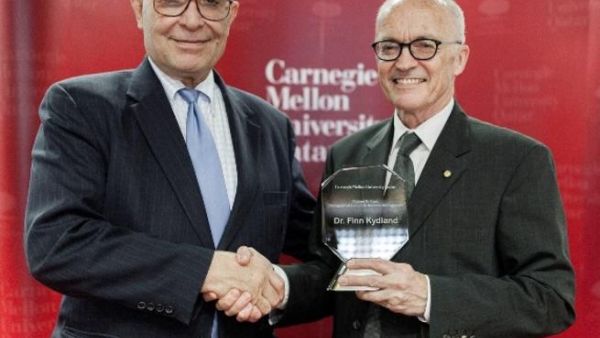Carnegie Mellon alumnus and Nobel Laureate: Innovation and technological change lead to future productivity growth

“Innovation and technology are the main driving forces for economic growth, ultimately leading to future productivity,”noted Finn Kydland, Carnegie Mellon alumnus and Nobel Laureate, during the Richard M. Cyert Distinguished Lecture Series in Business Management at Carnegie Mellon University in Qatar. Kydland’s lecture, titled “Policy Consistency and the Growth of Nations,” outlined variation in the predictability of economies across nations and regions.
Progress is dependent on technology to convert capital and labor inputs into goods and services. “But, to take advantage of technological change, nations need investment in new capital, structures, equipment and its citizenry,” Kydland said.
“Government policy may bea crucial factor in this respect. Smaller countries need to promote economic growth. To do this they need a skillful workforce. Encouraging people to gain the right skills is a way to solve the problem and the best way to do this is through the education system,” he said.
As a global research university, Carnegie Mellon is an important contributor towards economic growth through its pioneering research and innovations, by both students and faculty. In Qatar, Carnegie Mellon is committed to training the next generation of researchers and scientists who can help Qatar build and maintain a knowledge-based economy.
“I believe that Carnegie Mellon’s existence in Qatar is contributing towards the development of human potential and is therefore a key factor towards the growth of the nation,” said Batoul Khalifeh, Carnegie Mellon Qatar alumna and a banking services specialist at Commercial Bank of Qatar.
“Even though I graduated from Carnegie Mellon last year, I try to attend as many university events as possible and I find that the Distinguished Lecture Series are always really thought-provoking. I was especially interested in hearing Dr. Kydland’s remarks on the need for a commitment mechanism to mitigate against inconsistency in future policy decisions,” she added.
Kydland was the joint recipient of the 2004 Nobel Prize in Economic Sciences, together with Edward C. Prescott. Both were recognized “for their contributions to dynamic macroeconomics: the time consistency of economic policy and the driving forces behind business cycles,” according to the official website of the Nobel Prize.
Kydland holds the Richard P. Simmons Distinguished Professorship at Carnegie Mellon University, where he earned his Ph.D. He is also the Henley Professor of Economics at the University of California, Santa Barbara.
Background Information
Carnegie Mellon University Qatar
For more than a century, Carnegie Mellon University has challenged the curious and passionate to imagine and deliver work that matters. A private, top-ranked and global university, Carnegie Mellon sets its own course with programs that inspire creativity and collaboration.
In 2004, Carnegie Mellon and Qatar Foundation began a partnership to deliver select programs that will contribute to the long-term development of Qatar. Today, Carnegie Mellon Qatar offers undergraduate programs in biological sciences, business administration, computational biology, computer science, and information systems. Nearly 400 students from 38 countries call Carnegie Mellon Qatar home.






